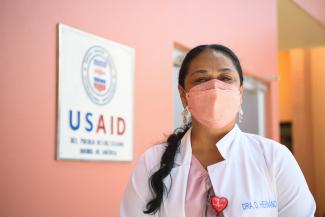HUMANITARIAN ASSISTANCE IN HONDURAS
Honduras is vulnerable to multiple and recurrent climate-related hazards, including droughts, floods, earthquakes, landslides, and storms. These hazards— which continue to intensify due to climate change—frequently damage crops and infrastructure and undermine livelihoods.
Hurricanes Eta and Iota—which made landfall in November 2020 and marked the first time on record that Honduras experienced more than one hurricane in a single storm season—affected more than 4.5 million people, according to the Government of Honduras and the World Bank. The two storms resulted in 99 deaths, prompted the evacuation of more than 1 million people, and significantly damaged crops.
Recurrent drought, especially in the country’s Dry Corridor, which covers much of southern and western Honduras, has faced increasing food insecurity in recent years. For 2023, due to El Niño Southern Oscillation (ENSO), forecasts predict a 30-40 percent reduction in rains for some key productive regions, which will have a direct effect on exacerbating food insecurity for Hondurans. According to the food assistance outlook brief, between 1.5 and 2.0 million (20-40 percent of the population) will face acute food insecurity by November 2023.
USAID’s Bureau for Humanitarian Assistance (USAID/BHA) supports humanitarian partners to provide emergency food assistance across Honduras. Some examples of this assistance include:
- Through the delivery of cash transfers for food and in-kind food assistance, USAID/BHA partners are reducing food consumption gaps to prevent and address acute food insecurity among vulnerable households, particularly during the country’s April— August lean season when food is scarcest.
- USAID/BHA partners are also providing agricultural support to smallholder farmers to ensure appropriate and timely inputs for planting and growing seasons—such as distributing farming tools, fertilizer, and seeds—to improve food security.
- USAID/BHA partners are training smallholder farmers to implement climate-resilient farming practices, including topics such as diversification of crops, drip irrigation and soil management to increase production.
In addition, USAID/BHA partners are helping vulnerable households restore livelihoods, increase financial resilience, and mitigate the impact of future shocks. This assistance includes the creation of community savings and loans groups, the provision of financial literacy courses, and the resumption and expansion of income-generating activities.
USAID/BHA partners also work with local organizations to mitigate, prevent, and respond to protection concerns in Honduras, particularly child protection risks and the needs of individuals affected by gender-based violence. As part of its integrated approach to protection programming, USAID/BHA partners are delivering case management and psychosocial support services to vulnerable individuals—particularly adolescents, children, LGBTQI+ populations, women, and other at-risk demographics. Implementing partners also provide multi-purpose cash assistance to help affected individuals meet basic needs and start or restore livelihood activities to increase financial independence.

